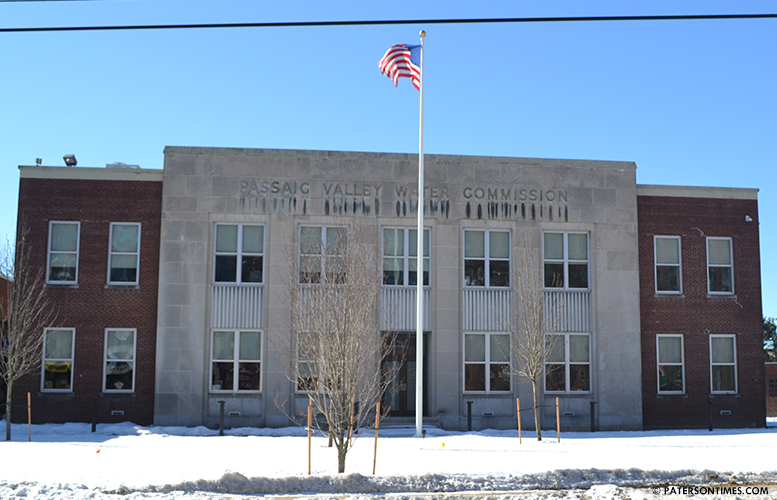The Passaic Valley Water Commission on Wednesday met in public for the first time since the pandemic shutdown began 16 months ago. But with three top PVWC officials now gone, it wasn’t just business as usual—or was it?
PVWC meetings have been conducted via Zoom for the past 16 months, so when the commissioners gathered in Clifton on Wednesday, it marked a return to the new normal. Except none of the three men who have led the PVWC for decades were there to answer any questions the commissioners might have had.
The recent retirements of PVWC executive director Joseph A. Bella, chief engineer Jim Duprey, and legal counsel George Hanley has created a leadership vacuum at a critical time when the PVWC is readying a $60 million plan to tackle lead and to revive the long-stalled Levine reservoir project. All three retired in the spring.
Their departure has also touched off a new round of infighting among commissioners from Paterson, Passaic and Clifton, and at stake is control of the PVWC—and the power to dole out the jobs and promotions that come with it.
A search firm has been hired to find a new executive director for the agency. Yaacov Brisman has been tapped to serve as legal counsel. And the chief engineer has yet to be replaced.
In the meantime, there is much work to do. A feasibility study scheduled to be completed late this summer will determine whether the tank project at the Levine reservoir can be configured to pump water into the raceway in the Great Falls National Historical Park. Restoring the raceway is one of the main goals of the National Parks Service, but whether it’s feasible with the Levine project, and at what cost, will only be known when the study is finished.
Louis Amodio, the interim business administrator, said the brain drain at the PVWC won’t prevent any projects from moving forward.
“We have institutional knowledge that is on staff, and some them have been on staff since the inception of these projects,” Amodio said. “And we feel extremely confident in their ability.”
Wednesday’s first order of business was lead, a longstanding problem in the PVWC system, and what to do about it.
The commission first heard via Zoom from David J. Pascrell, the son of the congressman from Paterson and a lobbyist, who is working a plan to remove an estimated 6,700 lead service lines from the PVWC system.
Those lead service lines connect the home to the main are the property of the homeowner. The PVWC is willing to remove them, free of charge, but would need the permission of the homeowner.
To pay for the program, the PVWC is planning to float a $60 million bond issue, with $18 million of that debt forgiven with financing through the New Jersey Infrastructure Trust Bank.
The PVWC appeared ready to adopt the program on Wednesday, but tabled the vote until next month when some commissioners complained they hadn’t been given enough time to consider all the details.
“I think there has to be better communication,” said commissioner Gerald Friend of Clifton. “The commission has to be better informed as to what is going on.”
Lead is a longstanding problem in the PVWC system, which contains many old homes with lead pipes connecting to the main. The PVWC is willing to remove the lead service lines free of charge, but it needs the owner’s permission to go the property.
Pascrell explained there’s a new state law that would allow the PVWC to remove the line even without the owner’s permission. But Paterson, Passaic, and Clifton first have to adopt municipal ordinances giving the PVWC the power to do that.
“Without permission to get on the property, we can’t replace the pipe,” said commissioner Joseph Kolodziej. He said a letter will go out to the three city governments asking that they adopt ordinances.
The commissioners spent most of Wednesday’s first in-public meeting behind closed doors, arguing — and ultimately agreeing — to promote 26 rank-and-file workers.
Commissioner Joseph Kolodziej of Clifton said the promotions would open up other positions, creating a ripple effect in which the PVWC would hire more people down the line. Kolodziej said big changes to the table of organization should be subject to the approval of a new executive director, and he voted against the promotions.
The commission adopted the measure, 5 to 1. Commissioner Jeff Levine left the meeting before the vote.
“That’s 10 percent of our workforce,” Kolodziej said afterward. “I don’t think there is any urgency to these promotions. And I think it is more important we make organizational changes, once we have a permanent executive director in place who can make recommendations to us.”
PVWC chairwoman Ruby Cotton of Paterson said the promotions were all rank-and-file workers who weren’t involved in project planning or executive decisions.
“These are the little people,” Cotton said. “They are not the people who are making the decisions.”



